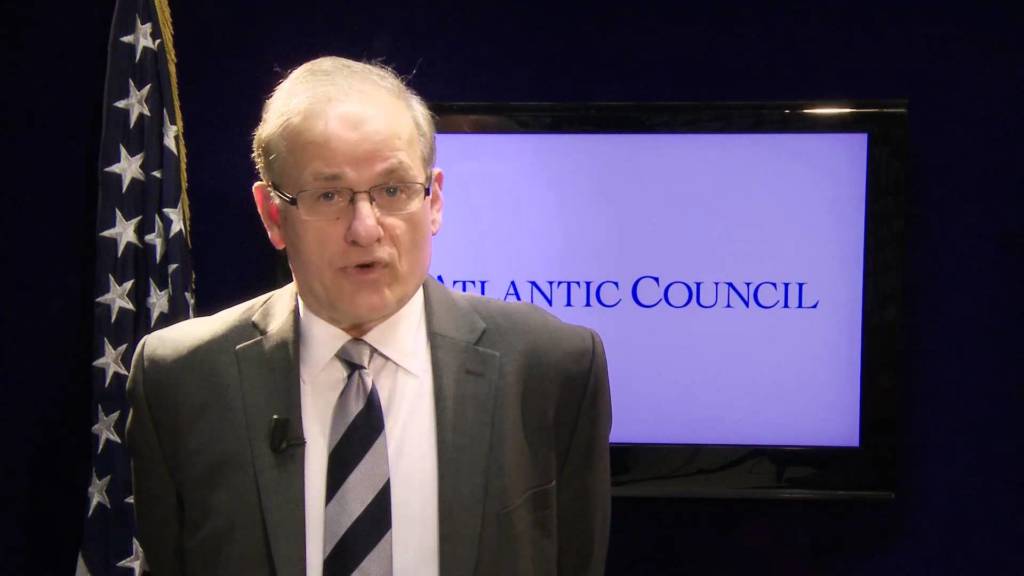The recent New York Times Magazine profile of Ben Rhodes, President Barack Obama’s foreign policy messaging chief, provides proof that the Obama administration’s failure to protect Syrian civilians was because it was so intent on pursuing a nuclear agreement with Iran, Obama’s former top Syria adviser charged Monday in a withering essay for the Atlantic Council.
Frederic C. Hof, an Atlantic Council senior fellow who was formerly Obama’s special adviser for transition in Syria, focused on the argument Rhodes gave for not intervening in Syria. “I profoundly do not believe that the United States could make things better in Syria by being there,” Rhodes said. “And we have an evidentiary record of what happens when we’re there—nearly a decade in Iraq.”
Hof countered:
Yet the official alibi lacks one critical ingredient: the truth. A “decade in Iraq” did not dissuade the Obama administration from protecting Syrian Kurds from a massacre by the Islamic State (ISIS, ISIL, Daesh) in Kobani. Disaster in Iraq did not deter American military forces from protecting Yazidis in Iraq itself. The Iraqi fiasco has not stopped the Obama administration from establishing an anti-ISIS American military presence in both Iraq and Syria: yes, boots on the ground. No: the Rhodes-Obama fear and dismissal of making things better in Syria “by being there” applies only to those parts of Syria experiencing mass murder and massive displacement at the hands of [Syrian president] Bashar al-Assad. Why? Iran.
President Barack Obama. (AP/Jacquelyn Martin)
David Samuels, the writer of the profile, explained that “by eliminating the fuss about Iran’s nuclear program, the administration hoped to eliminate a source of structural tension between the two countries, which would create the space for America to disentangle itself from its established system of alliances with countries like Saudi Arabia, Egypt, Israel and Turkey. With one bold move, the administration would effectively begin the process of a large-scale disengagement from the Middle East.”
This confirmed Hof’s own conclusion about what stopped Obama from intervening to protect civilians from Assad: the “pursuit of a nuclear agreement with Assad’s premier long-term enabler and partner in mass murder: Iran.”
The Washington foreign policy establishment—dismissed by Rhodes as “the Blob”—loudly objected to the Obama administration’s inaction against Assad. But the revelation of Rhodes and Obama’s long-term goal in the Middle East explains why they went unheeded.
To complicate the ability of Iran’s man in Syria to commit war crimes and crimes against humanity would have placed at risk nuclear negotiations aimed ultimately at dissolving American relationships of trust and confidence with key regional powers. Yes, the Blob—the foreign policy establishment—would have had a problem with this. Hence an information operation headed by Rhodes aimed at avoiding head-on debates with the Blob or, for that matter, the representatives of the American people in Congress.
Hof credited Rhodes for spelling out Obama’s foreign policy framework so clearly, but suggested that the next administration turn to the “thoughtful (if fallible) and experienced (if imperfect) foreign policy practitioners—yes, the thoroughly disrespected ‘Blob’—to undo the damage they have done.”
Richard Cohen of The Washington Post made a similar critique in his column Tuesday:
Rhodes calls the foreign policy establishment “the Blob” and he, like the president, dismisses its fusty thinking and crows the cleverness of their own, especially — and amazingly — the success of their Syria policy. Their only standard is the number of Americans who have died there — very few. That is commendable, but it is false to assert by implication that an alternative policy would have done otherwise. The intervention in Libya cost zero American lives; so too the ones in Kosovo and Bosnia. The United States could have implemented a no-fly zone in Syrian skies. It could have grounded the Assad regime’s helicopters, which drop barrel bombs on civilians, eviscerating them with nails, pellets and scrap.
No one knows anymore how many have died in Syria’s civil war — maybe as many as 400,000. More than 4 million people have fled the country, swamping Europe and coming pretty close to destabilizing governments. The continent has turned sour, inhospitable to migrants yet hospitable to right-wing groups last seen in black-and-white newsreels. Russia now arguably has more influence in the Middle East than the United States does, and Iran and its proxies are everywhere. The United States hasn’t pivoted. It’s plotzed.
If this is success, what constitutes failure?
By: TheTower.org
Do You Love Israel? Make a Donation - Show Your Support!
Donate to vital charities that help protect Israeli citizens and inspire millions around the world to support Israel too!
Now more than ever, Israel needs your help to fight and win the war -- including on the battlefield of public opinion.
Antisemitism, anti-Israel bias and boycotts are out of control. Israel's enemies are inciting terror and violence against innocent Israelis and Jews around the world. Help us fight back!
